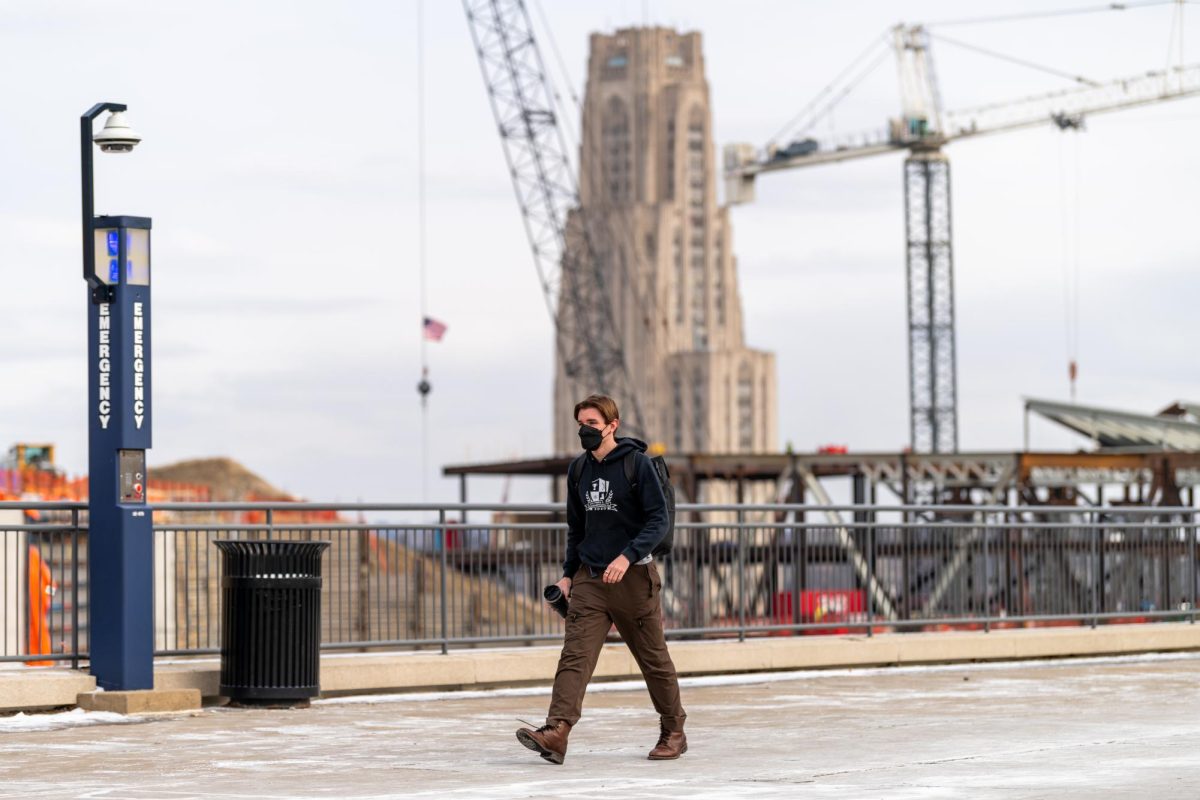Almost four years after the initial outbreak of COVID-19, new virus strains continue to necessitate attention and precautions.
According to Dr. Graham Snyder, JN.1 is the newest and now most dominant variant in “another long line of Omicron strains.” Snyder noted that JN.1 is of interest because of its potential to cause “immune escape.”
“In other words, it might cause trouble for our immune system to recognize it because of mutations that had gone on over time,” Snyder, medical director of infection prevention and hospital epidemiology at UPMC and associate professor at Pitt’s School of Medicine, said.
Snyder said even almost four years after the initial outbreak, masking is still of the utmost importance, especially during times of outbreak.
“If you do need to, by the course of your day, be exposed to other people, masking is really effective at preventing you from being exposed,” Snyder said.
In an email sent at the beginning of the academic year, Vice Provost Kenyon Bonner and Medical Director of Pitt’s vaccination and health connection hub Dr. Joe Suyama encouraged students to take precautions against COVID-19 and other respiratory illnesses by masking, getting vaccinated, testing and isolating when sick.
Snyder emphasized the importance of new antiviral treatments that emerged for people to use when they have COVID.
“For people who are vulnerable to complications, there’s antiviral treatment for both COVID-19 and influenza,” Snyder said. “The antiviral treatments for both are effective at reducing the risk that you have to see a doctor or be hospitalized or die of those viruses, and it’s important to start those early.”
Because the COVID virus mutates and adapts, Snyder explained the necessity of getting the newest vaccine each year.
“Each season will need an updated vaccine that helps prepare our immune system to recognize the changing viruses,” Snyder said. “If you have not had your last dose of COVID-19 vaccine for some time, or if you’ve never been vaccinated, this latest vaccine will prepare your immune system to recognize the change in virus.”
Morgan Hayes, a sophomore ecology and evolution major who has a chronic illness, said she contracted COVID from a family member around Christmas. She experienced the typical COVID symptoms, including muscle aches, brain fog, sinus congestion, “extremely low” blood pressure and a fever that climbed as high as 103.5 degrees.
Hayes did not receive the most recent COVID vaccine because the last COVID vaccine she received last spring gave her an adverse reaction. She consulted her doctor when making the decision not to get the newest vaccine.
“I had such a horrible reaction to it,” Hayes said. “Like it almost hospitalized me, so I did not get the new strain vaccination.”
Taylor Kingerski, a junior anthropology major, also contracted COVID over the holidays.
“On Christmas Eve, my family had to go to the emergency room for an injury,” Kingerski said. “As me and my mom both got COVID at the same time, we highly suspect we got COVID from the emergency room.”
Like Hayes, Kingerski did not get the most recent COVID vaccine due to a previous adverse reaction.
“The last time I got a vaccination for COVID was a booster shot, and it was when they first came out with it,” Kingerski said. “I would’ve got others after that but I had a very bad reaction to the shot, and I’ve been afraid of getting it ever since.”
Nevertheless, Kingerski said everyone who can get the vaccine should get it and to continue wearing masks.
“My advice is for everyone to continue wearing masks and to get the new updated vaccine,” Kingerski said.
As far as how to cope with symptoms if one does get sick, Kingerski said taking medications helped him. People should consult their doctor before taking any new medications.
“If it’s not too bad, take different fever-reducing and congestion-relief medicines,” Kingerski said. “Air humidifiers really helped me as well. If you are doing particularly worse than a cold, I would recommend Paxlovid. My mom took it as she also had COVID the same time as me and it really helped her, and she didn’t have any complications from it. It could really alleviate the worst.”
Since getting COVID, Kingerski said it has made his immune system “basically collapse.”
“It took advantage of a previous sickness when my immune system was weak,” Kingerski said. “And then directly after, bacteria took advantage of what COVID did to me and now I’m sick with a bacterial infection. Getting COVID doesn’t mean just COVID, it can mean other sicknesses in quick succession. Before you think it’s OK if you get infected with COVID, please consider you may be jeopardizing more than just a week of being sick.”



